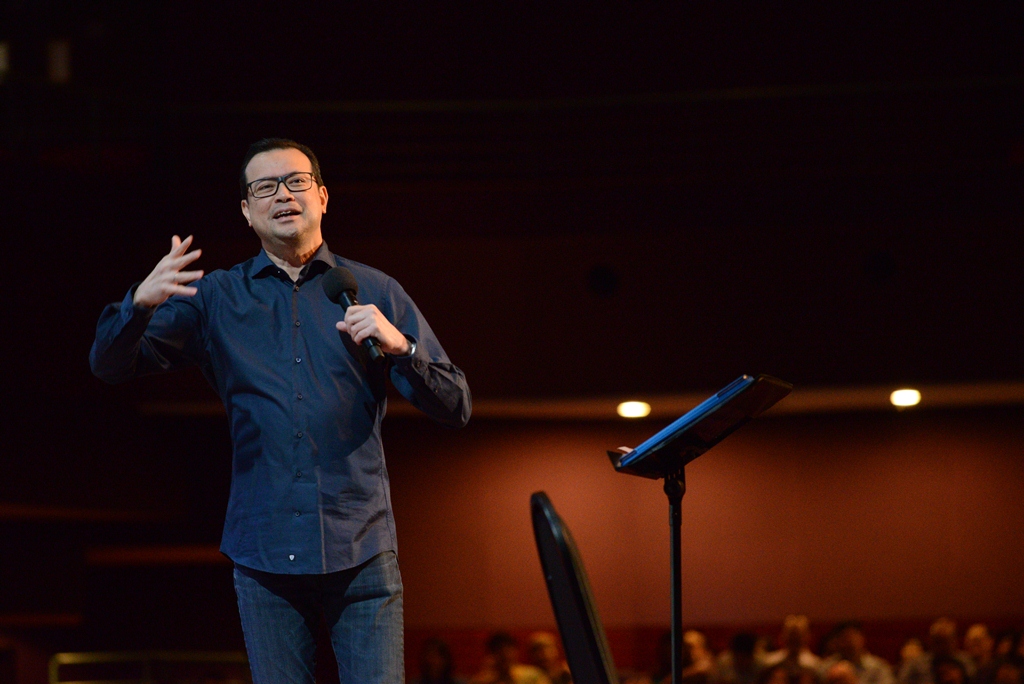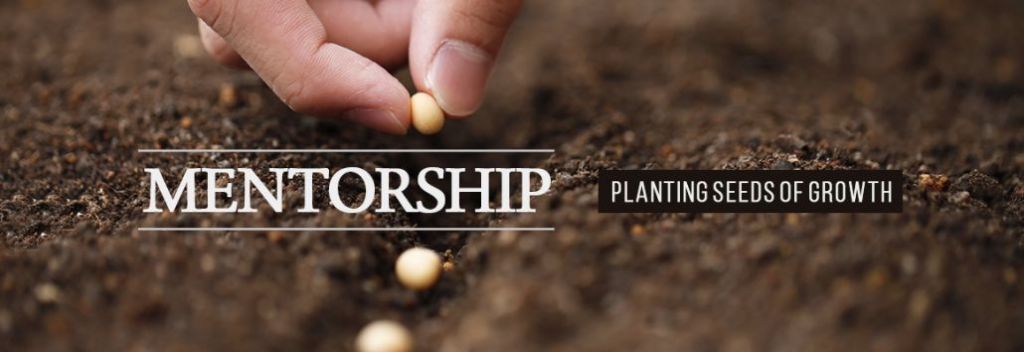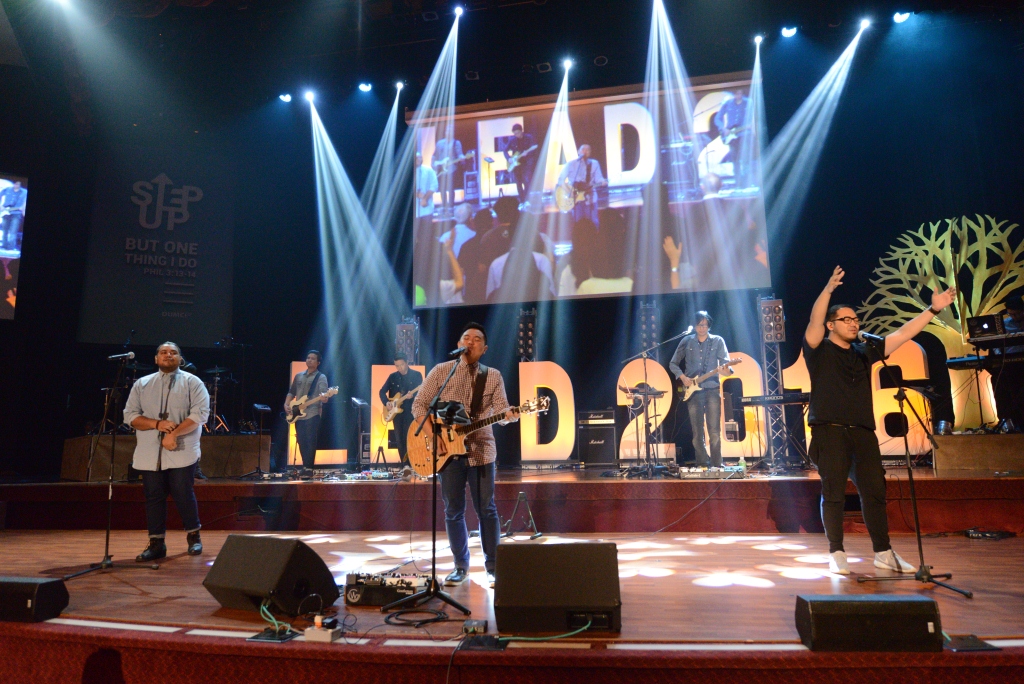
The LEAD Conferences held every year at DUMC is well-known as one of the premier seminars for Christian leadership in Malaysia. For LEAD2016, the prominent speakers that were invited to teach were Prs Joey and Joseph Bonifacio, Gary Skinner, and Pr Jeffrey Rachmat.
Pr Rachmat is the founding and senior pastor of the well-known Jakarta Praise Community Church (JPCC), the same church that Sidney Mohede comes from, and the worship sessions in LEAD2016 were led by Sidney. In his second plenary session (the 3rd in the conference) Pr Rachmat shared about the secret of producing fruit that follows.
‘Every great thing start with something small,’ he shared, ‘and every key to that door is different for each person.’ However, we often see people resistant to change because they’re afraid of facing the truth, whether in themselves or in their situations. The way we see problems matters. ‘Perspective changes everything so we need God’s word in our lives. We need to learn to see our situations in the way God would view them.’

God’s word changes our perspective, not the situations we’re in, but the product is long-lasting and we need to distinguish fruitfulness from success. Christians are not just called to be successful but to be fruitful for success can disappear or otherwise alter overnight, even take a person down the wrong road, but fruitfulness produce legacies that last.
Pr Rachmat imparted that because leadership is necessarily dealing with people, the meaning of good leadership is in adding value into those people’s lives. Part of this in seeing the gold in people and refining that gold. Gold is something that most people find a valuable commodity but even they were once mixed with dirt. It takes time to disciple a person but we need to learn to celebrate every triumph in the journey.

The Christians’ goal in life is to be fruitful. What does it mean to be fruitful? We find this through the connotation of the process in bearing fruit. A tree bears fruit for others to enjoy. The tree may bear a heavy weight in the fruit that it carries but it is satisfied. And if someone were to come and pick the fruit and lighten the weigh, the tree would bear fruit again.
This is interlinked with the purpose God has set apart for it. Everything about the fruit of the tree is in serving others. The tree bears the weight of fruit but it does not complain for it has found joy in its purpose. It is important to find our purpose in life for it will shift our focus from the weight to the harvest.

‘God is not sadistic and He does not delight in pain. But this need for purpose is intrinsic to every person. Imagine if a professional soccer player were to sit on the bench for a whole soccer season. He would still be collecting his salary; in fact he would be earning a lot of money for something very light and easy. But he would not be happy because his life would not have any meaning. All the skills he had built up and his identity as a professional soccer player would basically amount to nothing.’
Our significance comes when we start contributing our skills towards building something. It is easy to recognize the tree when we see its fruit. A good and healthy tree produces good and healthy fruit, each to its own kind. Similarly for Christians as children of God, we ought to bear the fruits of His Spirit (John 15:8). The presence of the Spirit of God is what distinguishes and identifies Christians. It is going beyond success. Our primary mission is that God may be glorified through our fruits.
How do leaders find and develop the strength of their followers? There must be a healthy communication and follow-through between leaders and followers. How do we then lead people on the journey through to fruitfulness?

The key often start small and the beauty of it is that they are all unique – personal and individual – for each person. God has prepared specific situations and circumstances (culture, etc.) for each of us to produce fruit and each of us already have our own keys (Ephesians 2:10). Going further with our key, God has also given us a counsel and a pattern to follow through His word.
Psalm 92:13-15
13Planted in the house of the LORD,
They will flourish in the courts of our God.14They will still yield fruit in old age;
They shall be full of sap and very green,15To declare that the LORD is upright;
He is my rock, and there is no unrighteousness in Him.
This specific pattern found in Psalm 92:13-15 is both a great reminder and encouragement. We need to be planted in the church where we can flourish so that we can bear the fruits of the Spirit, and all of these happen within the courts of our God. There is a great privilege in taking up the mantle of leadership, Pr Rachmat expressed.
Being planted in the church has a connotation of not just attending services every Sunday but of being rooted, not easily moved. When a person is rooted no amount of problems or conflicts would diminish their commitment. There is no perfect church for it is not about the church but all about the faith. A rooted Christian is easily able to distinguish the reasons he goes to church. They are able to recognize that the church is supposed to be the soil that brings forth fruit.
For leaders, we need to develop people who are rooted in the faith like this in our churches. ‘Every great thing came from small things. The potential for the future of the tree is in a little seed, and in that seed are also many other fruits. And in time those fruits would go on to produce many other seeds which would go on to produce many other fruits. Our God is a generational God and everyone has a seed in them.’

Through the Parable of the Sower, Scripture also teaches us many things. ‘The problem is with the soil. The soil must be able to accept the seed. This word ‘accept’ is a huge one; it denotes a token of love. Christ accepted us while we were still sinners, setting a model for us as Christian leaders. The seed needs to break open in order to grow. It needs a secure environment. It needs nurturing by people of integrity and love that can be trusted.’
The great responsibility of Christian leadership is to prepare the next generation for the Kingdom of God, both in ministry as well as in identity. A church grows and stays strong when the current leadership board has people they can pass the baton to. Preparation of the ground is a crucial element of a healthy church. It is a sad thing when trees just exist but has no significance. Christians need to rise to their God-given significance. This is what it means to be fruitful.

There is a great dynamic in the new generation, Pr Rachmat conveyed. We need to develop passion in our young people. Get them involved and nurture them. Don’t talk down to them or dictate things to them but learn to listen and communicate.
For many of us there is a question that we need to ask; who are we surrounding ourselves with? Are they conducive to our spiritual health? This is not about good or bad people, Christian or otherwise. But we need to surround ourselves with people who share a passion for the things of God and an excitement for the things He is doing, not just in the past but even in our time and in the future time to come.
NOTE: All pictures from LEAD2016 were kindly contributed by Damansara Utama Methodist Church. If you would like to be part of next year’s conference, you can find more details about how to join LEAD2017 through DUMC’s LEAD2017 registration webpage.
|Share The Good News|
Jason Law




Leave a Reply